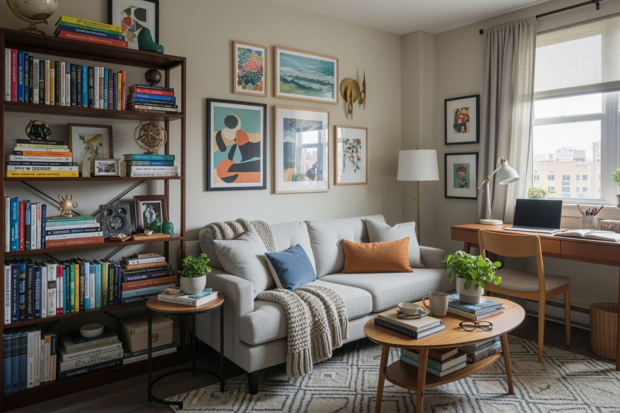Your Comprehensive Guide to Seamless Temporary Stays
In today’s global academic landscape, mobility is essential. Scholars, researchers, and professors frequently undertake research trips, earn fellowships, or go on sabbatical in new cities and countries. During these periods of intense focus, the last thing an academic needs is the logistical burden of securing and setting up a home. Temporary furnished apartments offer the definitive solution, providing comfortable, move-in ready housing that allows scholars to immerse themselves in their work from day one. These fully equipped homes eliminate the stress of purchasing furniture, establishing utility accounts, or navigating the complexities of long-term lease commitments, creating a stable foundation for a productive and enriching academic experience.
A Closer Look: What Are Temporary Furnished Apartments?
- Truly Move-in Ready: These residences are fully furnished and equipped with everything from major appliances and kitchen essentials to linens and towels, allowing for an effortless transition.
- Flexible Tenancy Terms: Lease durations are designed for academic life, typically ranging from 30 days to nine months, accommodating the timelines of most fellowships, research projects, and sabbaticals.
- Economically Sound: For stays exceeding a few weeks, they are significantly more cost-effective than hotels and eliminate the substantial upfront costs associated with unfurnished rentals.
- All-Inclusive Living: The rental price often includes utilities like electricity, water, gas, and high-speed internet, simplifying budgeting and removing the administrative task of setting up individual accounts.
- Designed for Academics: Many hosts, particularly on platforms like SabbaticalHomes.com, are part of the academic community themselves and understand the unique requirements and schedules of their guests.
Finding the right temporary home can profoundly influence the success of your academic stay. As one history professor shared with our team: “Her sabbatical in a furnished apartment near a key archive allowed her to complete the primary research for her book in half the expected time. The convenience of a prepared, comfortable living space eliminated so many logistical problems, freeing up invaluable time and mental energy for her work.”
The right temporary furnished apartment provides the stability, comfort, and convenience that allows scholars to focus entirely on their professional objectives. Since 2000, SabbaticalHomes.com has been a trusted, dedicated resource for the academic community, connecting scholars with affordable, short-term furnished housing options. Our expertise is rooted in addressing the unique challenges of finding reliable and suitable accommodation for minds on the move.
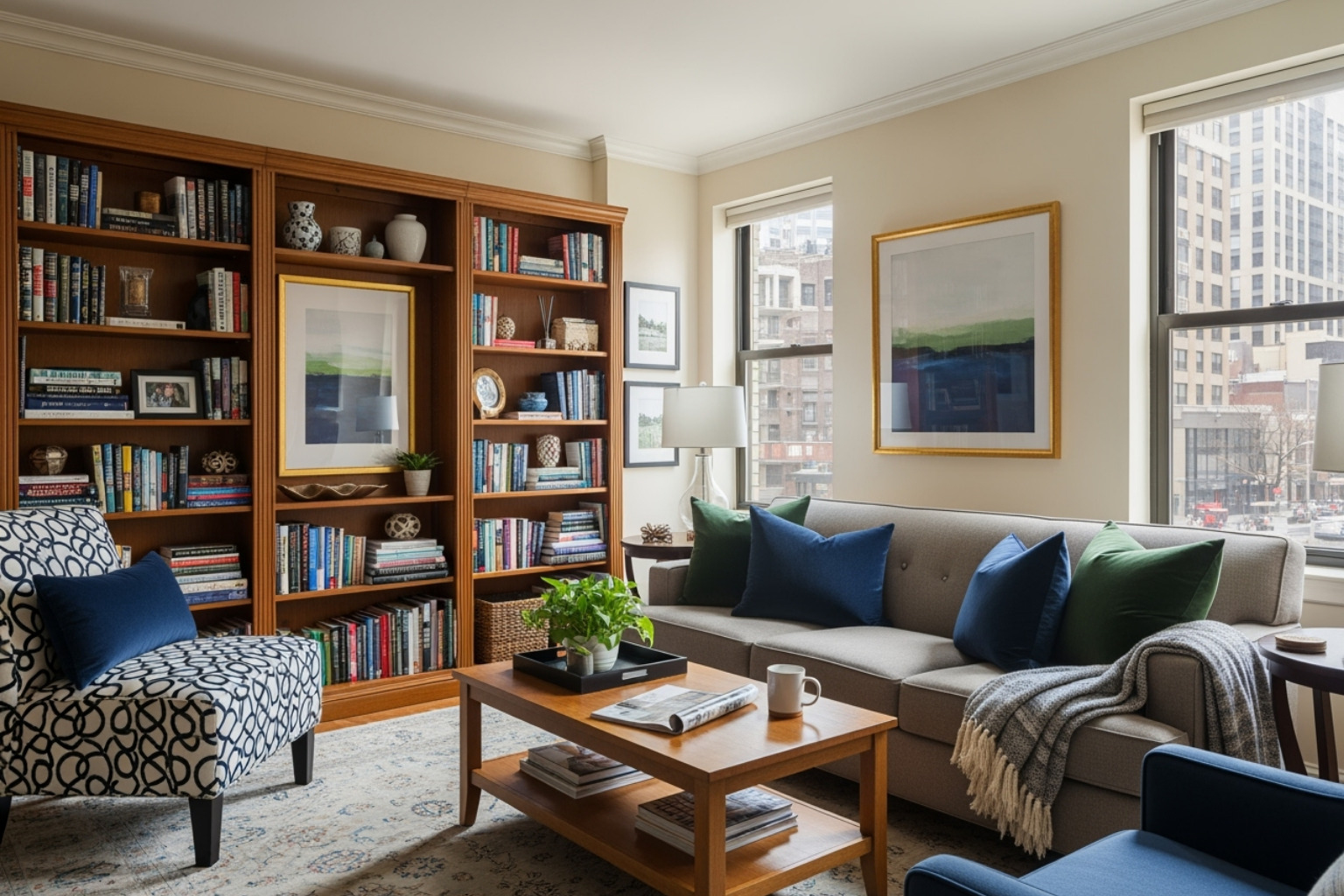
Handy temporary furnished apartments terms:
What Exactly Is a Furnished Apartment?
A furnished apartment is a residential unit that comes equipped with all the furniture and household items necessary for daily living. Unlike an unfurnished rental, which is an empty space, these homes are prepared for immediate occupancy. This allows you to arrive with your personal belongings and settle in quickly, directing your energy towards your primary purpose—be it research, teaching, or completing a fellowship. The level of furnishing can vary, so it’s important to understand the different categories.
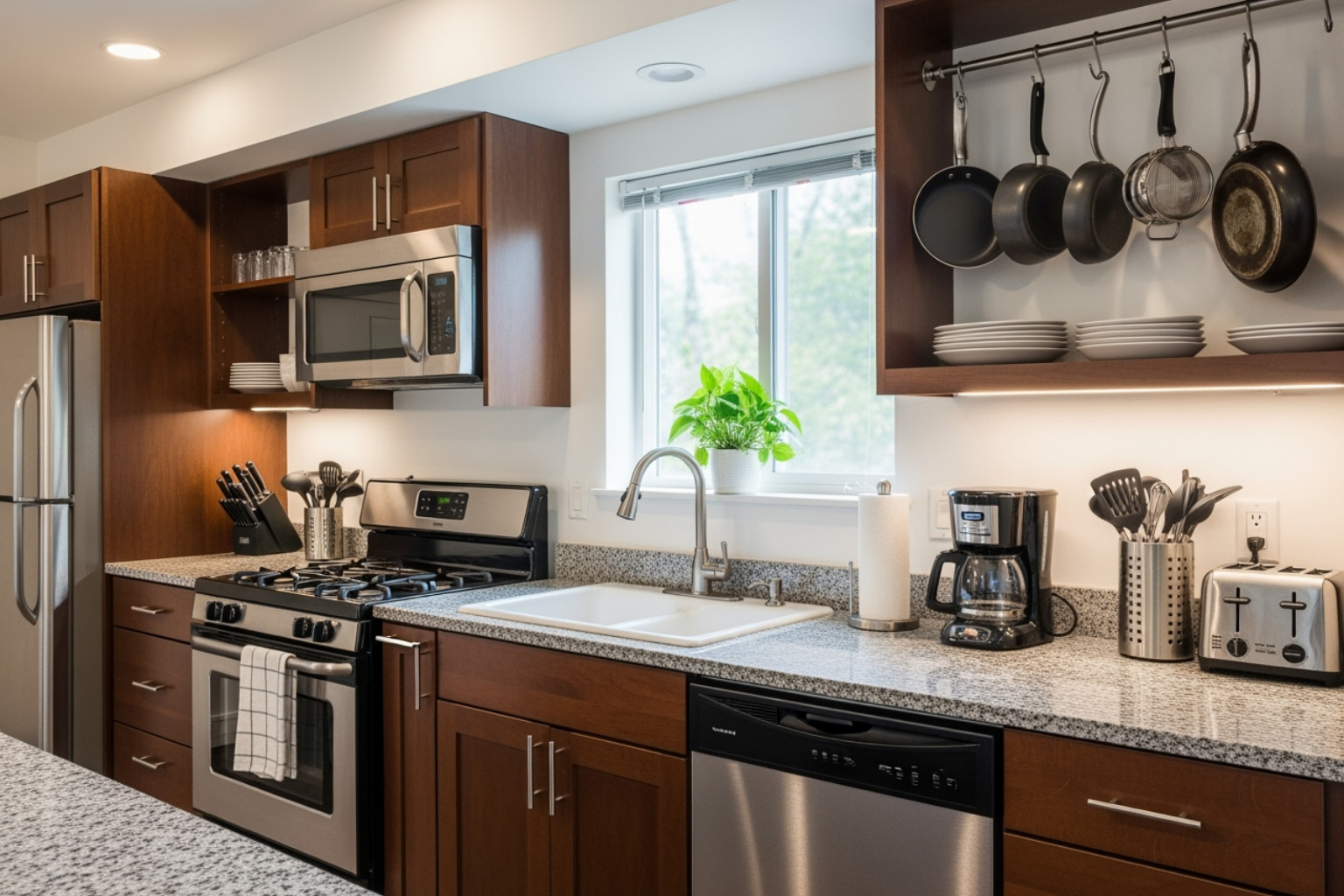
- Semi-Furnished: This is the most basic level. A semi-furnished apartment might only include major appliances (refrigerator, stove) and essential large furniture items like a bed frame, sofa, and dining table. You would likely need to provide your own mattress, kitchenware, linens, and smaller furnishings.
- Fully Furnished: This is the most common type of temporary rental. It includes all the items of a semi-furnished unit, plus everything needed for comfortable daily living. This means a complete set of furniture, a mattress, kitchenware (pots, pans, dishes, cutlery), small appliances (microwave, coffee maker, kettle), and basic linens.
- Fully Serviced or “Turnkey”: This represents the gold standard for convenience. A turnkey home is fully furnished and also includes all utilities (electricity, gas, water, Wi-Fi) in the rental price. Often, these properties also feature flexible self check-in options and may include a starter pack of consumables like soap and paper towels. For academics, this is the ideal standard as it provides a completely straightforward transition into a productive environment.
Before moving in, it is crucial to complete an inventory checklist and document the property’s condition with photographs or a video. This simple but vital step creates a clear record of the apartment’s state upon your arrival, which can prevent potential disputes over the security deposit when you depart.
For more information about what we offer, you can explore our home rentals page.
Room-by-Room Essentials: A Detailed Look
A well-appointed furnished apartment is thoughtfully equipped to support both professional work and personal relaxation. Here’s a more detailed overview of what you should expect to find:
- Living Area: A comfortable sofa and/or armchairs, a coffee table, end tables, and adequate lighting (including reading lamps). For academics, the inclusion of bookshelves is a significant plus for organizing research materials.
- Bedroom: A sturdy bed with a quality mattress, pillows, and a full set of linens (sheets, duvet/comforter, pillowcases). Essential furniture includes a wardrobe or dresser for clothes storage and nightstands with lamps. Blackout curtains or blinds are a valuable feature for ensuring restful sleep.
- Kitchen: A fully functional kitchen should include a refrigerator/freezer, stove, oven, and microwave. A dishwasher is a common and highly convenient feature. The kitchen should also be stocked with a comprehensive set of pots and pans, cooking utensils, dishes, glasses, and cutlery. Small appliances are key: a coffee maker, electric kettle, and toaster are standard.
- Bathroom: A complete set of bath towels, hand towels, and face cloths should be provided. A shower curtain, bathmat, and wastebasket are also essential.
- Workspace: This is a critical area for any academic. A proper desk and an ergonomic, comfortable chair are non-negotiable. There must be adequate task lighting and conveniently located power outlets for charging devices. Proximity to a strong, reliable Wi-Fi signal is paramount.
A truly turnkey apartment for an academic goes beyond just furniture. It provides a seamless transition into a productive environment with a ready-to-use workspace, reliable high-speed internet, and a straightforward arrival process. This level of preparation allows you to focus on what brought you there in the first place—your academic work.
Related: Preparing Your Own Home for Guests
The Key Benefits of Choosing Temporary Furnished Apartments
Opting for temporary furnished apartments over other housing solutions can transform a potentially stressful relocation into a seamless transition, creating a solid foundation for academic and professional success. The advantages extend far beyond simple convenience, impacting your budget, productivity, and overall well-being.
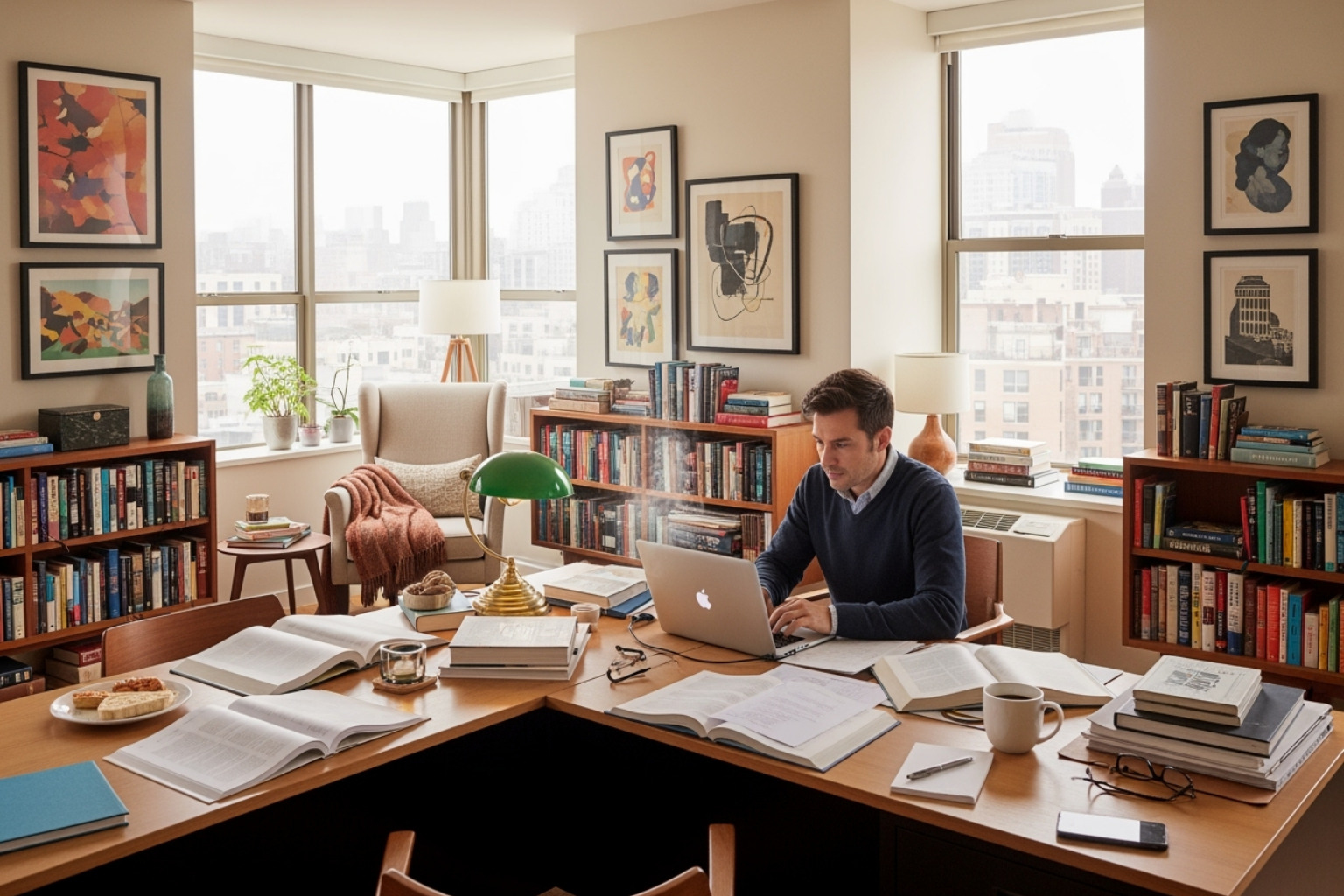
Unparalleled Convenience and Time-Saving: The most immediate and significant advantage is arriving at a space that is completely ready for living and working. Consider the alternative: renting an unfurnished flat involves weeks of logistical planning. You would need to research and purchase furniture, coordinate deliveries, set up accounts with multiple utility and internet providers (often requiring local credit history), and buy countless household items. With a furnished apartment, you bypass all of this. You can unpack your suitcase and immediately begin focusing on your research, teaching, or other professional responsibilities.
Superior Cost Efficiency for Mid-Term Stays: While the monthly rent for a furnished apartment may appear higher than that of an unfurnished unit, it is a far more fiscally prudent decision for stays of one to nine months. An unfurnished rental comes with numerous hidden costs: the purchase or rental of furniture, deposits for utilities, installation fees for internet, and the acquisition of every single household item from kitchen utensils to bedding. When compared to a hotel, a furnished apartment is vastly more economical for any stay longer than a week or two. Furthermore, in many jurisdictions, stays over 30 days are exempt from transient occupancy taxes, offering additional savings. The all-inclusive nature of many furnished rentals makes budgeting simple and predictable.
Generous Space and Greater Independence: Unlike the confined space of a typical hotel room, a furnished apartment provides a proper home environment with distinct areas for sleeping, working, and relaxing. This separation is crucial for maintaining a healthy work-life balance. Having a full kitchen offers complete independence, allowing you to prepare your own meals. This is not only a significant cost-saving measure but also supports personal dietary preferences and healthy routines. You have the freedom to work on your own schedule without the daily interruptions and lack of privacy inherent in hotel life.
Direct Impact on Productivity and Focus: A stable, comfortable, and well-equipped home base significantly reduces cognitive load. When you are not worried about basic logistical challenges, you can dedicate your mental energy to your academic goals. The psychological comfort of having a private, functional space cannot be overstated. Countless scholars find they accomplish more in a shorter period simply because their housing situation eliminates a whole category of daily distractions and stressors, allowing for deeper concentration and more effective work.
Access to Building and Community Amenities: Many apartment complexes offer valuable amenities that can improve your stay. These often include fitness centres, swimming pools, residents’ lounges, and quiet communal gardens. These facilities provide opportunities for exercise, relaxation, and sometimes even networking with other residents. For those seeking housing near prestigious institutions, options like being able to search for housing near Rockefeller University demonstrate how the right location provides both convenience and a connection to a wider academic community.
A Practical Guide to Renting Your Temporary Home
Finding the perfect temporary furnished apartment is made significantly easier by using a specialized academic platform like SabbaticalHomes.com. Unlike general-purpose rental websites, our community is built on a foundation of trust, peer reviews, and shared academic values. This connects scholars with hosts who inherently understand the timelines, budgets, and needs of academic life. This mutual understanding fosters smoother, more transparent transactions and a more supportive and collegial rental experience from the outset.
You can find your next rental or home exchange directly through our platform, where you will find a global inventory of properties custom to academic schedules and financial considerations.
Related: Questions to Ask Potential Landlords
Understanding Typical Lease Terms and Flexibility
Temporary furnished apartments are defined by the flexibility that academic life demands. However, it’s important to understand the standard framework for tenancy agreements.
- Duration: Leases typically range from a minimum of 30 days to a maximum of nine or ten months. This aligns perfectly with semester lengths, research grants, visiting appointments, and sabbaticals. The 30-day minimum is often dictated by local housing regulations that distinguish short-term holiday lets from residential tenancies.
- Extensions: If your research or appointment is extended, continuing your stay is often possible. Most hosts are amenable to extensions, provided you give them reasonable advance notice (typically 30 days). This allows them to adjust their property’s availability. Be aware that if you switch to a month-to-month arrangement after an initial term, the rent may increase slightly to reflect the added flexibility.
- Shortening a Stay: Early departure can be more complex. Most rental agreements have a minimum stay requirement (e.g., 30, 60, or 90 days). Leaving before this period concludes may incur financial penalties or the forfeiture of your deposit. The best practice is to communicate openly with your host about any potential for your timeline to change before you sign the agreement.
Navigating the Costs and Fees
Managing the financial aspects of your rental is more straightforward when you understand the typical cost structure. While the monthly rent may be higher than for unfurnished properties, it is generally more economical than an extended hotel stay and includes the significant value of convenience and amenities.
The primary factors influencing the rental price are location (proximity to city centres and universities), size and quality of the apartment, level of furnishings and amenities, and seasonal demand.
Be prepared for these standard one-time move-in costs:
- Application Fee: A nominal fee of $25-$100 that covers the cost of processing your application and any background checks.
- Security Deposit: This is typically equivalent to one month’s rent and is refundable. It covers potential damages beyond normal wear and tear. In some regions, like the UK, this deposit must be held in a government-approved protection scheme.
- Cleaning Fee: A non-refundable fee of $100-$300 that covers the cost of a professional deep clean of the apartment after you vacate, ensuring it is pristine for the next guest.
- Pet Deposit/Fee: If you are bringing a pet, expect an additional deposit ($200-$500) or a non-refundable pet fee.
Always request a complete and itemized breakdown of all costs and fees before signing a lease to ensure there are no surprises that could impact your research budget.
Related: SabbaticalHomes Reasonable Fees (Listing Fees and Match Fees)
How to Choose the Perfect Home for Your Needs
Selecting the right temporary furnished apartment is a critical decision that involves aligning the property’s features with your specific academic, professional, and personal requirements. A successful match will serve as a catalyst for a productive and enjoyable stay.
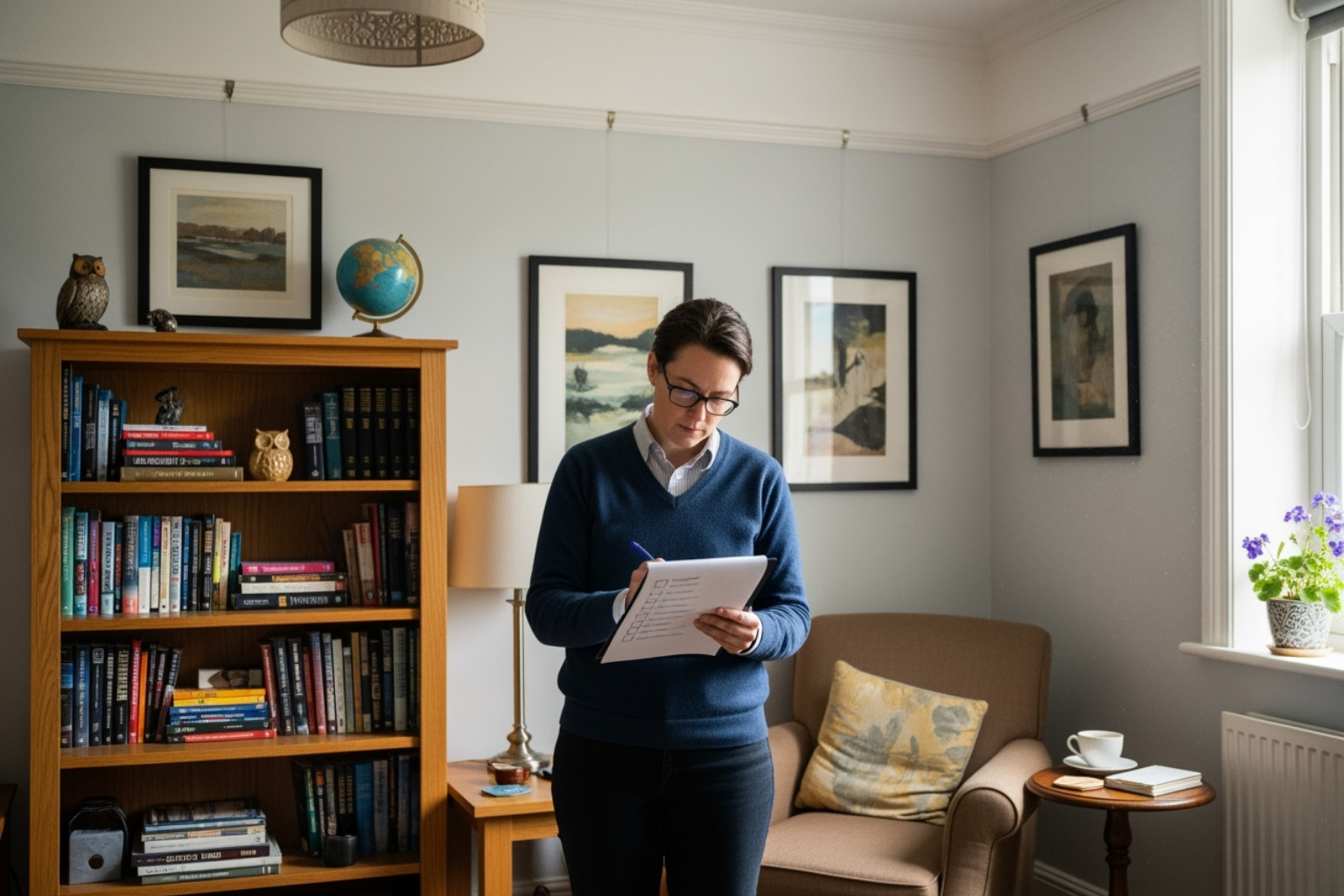
Our platform serves a diverse global community with varied needs, including:
- Academics on sabbatical requiring a quiet space for writing.
- Visiting professors and researchers needing proximity to labs or archives.
- Graduate students on fellowships or conducting fieldwork.
- Medical professionals on temporary assignment at teaching hospitals.
- Location-independent scholars and writers seeking an inspiring environment.
- Academics travelling with partners or families who need additional space.
We encourage all members to be transparent about specific needs, such as accessibility requirements, the need for a particularly quiet environment, or specific family-friendly features, to ensure a suitable match. Whether you are looking for homes to rent in academic hubs like Worcestershire, United Kingdom or another global destination, clarity is key to finding the right fit.
Comparing Furnished Apartments to Other Housing Options
For extended stays (one month or longer), temporary furnished apartments consistently emerge as the most practical and balanced choice.
- Versus Unfurnished Rentals: The primary drawback of unfurnished rentals for temporary stays is the immense logistical effort and high upfront cost. They require purchasing or renting furniture, establishing utility and internet contracts (which can be difficult without a local credit history), and outfitting an entire home. Furthermore, they almost always demand long-term lease commitments of 12 months or more, making them unsuitable for typical academic visits.
- Versus Hotels and Extended-Stay Hotels: While convenient for very short trips, hotels become prohibitively expensive for longer stays. They lack the space, privacy, and full kitchen facilities that are essential for a comfortable and productive experience. An extended-stay hotel may offer a kitchenette, but it still falls short of the space, separation of living areas, and authentic ‘home’ feeling that a proper apartment provides. The cost per square metre is invariably much higher in a hotel.
Key Factors for Academics to Consider
When evaluating potential temporary homes, prioritize these critical factors:
- Location and Commute: Proximity to your university, library, or research site is paramount as it saves valuable time and money. Use online mapping tools to research public transport routes, walking/cycling times, and the availability of local amenities like supermarkets, parks, and cafes.
- A Quiet and Conducive Environment: A peaceful neighbourhood and a well-insulated building are essential for concentration and rest. Do not hesitate to ask a potential host about noise levels from neighbours, street traffic, or nearby construction.
- Workspace Quality and Connectivity: This is non-negotiable. Scrutinize photos of the workspace. Is there a dedicated desk and an ergonomic chair? Is the lighting adequate? Crucially, ask about the internet. Request the advertised upload/download speeds or even a recent speed test result to ensure it can handle video calls, data uploads, and streaming.
- Host or Provider Reputation: Use platforms like SabbaticalHomes.com that are built on trust and detailed peer reviews. Read past reviews carefully to gauge the host’s responsiveness, accuracy of the listing, and how they handle any issues that arise.
- Safety and Maintenance Procedures: Verify the safety standards of the building and neighbourhood. Inquire about building security features like controlled entry systems. Ensure there is a clear and simple process for reporting any maintenance issues and ask about the expected response time for repairs.
Whether you need housing near the University Of Connecticut School Of Law or another institution worldwide, a methodical approach based on these considerations will guide you to the perfect home base.
Frequently Asked Questions about Furnished Stays
Navigating the rental process for temporary furnished apartments can bring up several questions. Here are clear, detailed answers to some of the most common queries from scholars.
What additional fees should I expect when renting a temporary furnished apartment?
Beyond the monthly rent, you should budget for several standard one-time fees to avoid any financial surprises. These typically include an application fee ($25-$100) to cover administrative processing, a refundable security deposit (usually equal to one month’s rent) to cover any potential damages, and a non-refundable cleaning fee ($100-$300) for the professional cleaning of the unit upon your departure. If you are travelling with a pet, a pet deposit or fee will also apply. For recurring costs, utilities are often bundled into the rent for convenience, but it is essential to clarify this with the host. Confirm precisely which utilities (electricity, water, gas, internet, television services) are included and whether there are any usage caps. This ensures your monthly housing cost is predictable and transparent.
Can I extend or shorten my stay without penalties?
Flexibility is a core benefit of temporary housing, but it operates within a structured framework. On SabbaticalHomes, members customize and sign a contract or lease to agree to terms in writing (templates of guidelines provided).
- Extensions: Hosts are generally very accommodating of extensions, especially when given sufficient notice (typically 30 days). This allows them to plan their calendar accordingly. If your plans are uncertain, discuss the possibility of an extension upfront.
- Early Departure: Shortening your stay can be more complicated. Most rental agreements include a minimum stay period (e.g., 30 or 60 days). If you leave before this period ends or break the lease without adhering to the agreed-upon notice period, you may be liable for termination fees or could forfeit your security deposit. The best strategy is always clear and early communication with your host about any potential changes to your timeline.
What is the difference between ‘normal wear and tear’ and ‘damage’?
This is a crucial distinction for the return of your security deposit. Normal wear and tear refers to the minor, gradual decline of a property from everyday use. Examples include minor scuff marks on walls from luggage, slight fading of curtains, or gentle wearing of carpet in high-traffic areas. Damage, on the other hand, is caused by negligence, accident, or abuse. Examples include a large stain on the sofa, a broken window, a deep scratch on a wooden floor, or holes in the wall. Your security deposit is intended to cover the cost of repairing such damages, not to refurbish the apartment for normal aging.
Do I need to purchase renter’s insurance?
While not always mandatory, purchasing a renter’s insurance policy is highly recommended and a very wise, low-cost investment. The host’s property insurance covers the building itself and their own belongings (the furniture), but it does not cover your personal possessions. Renter’s insurance protects your valuables—such as laptops, cameras, clothing, and books—against theft, fire, or water damage. It also typically includes liability coverage, which protects you financially if you accidentally cause damage to the property or if a guest is injured in the apartment. It provides significant peace of mind for a relatively small cost.
How do providers maintain the quality and safety of their apartments?
Reputable providers and platforms prioritize quality and safety. Professional management companies often have standardized procedures, including regular inspections, professional cleaning between guests, and 24/7 maintenance support. On community-based platforms like SabbaticalHomes.com, quality is upheld through a foundation of shared academic values, mutual respect, and a transparent system of peer reviews. Our member verification processes and community standards help ensure a safe and reliable experience. Individual hosts on our platform often provide a personal touch, with homes thoughtfully equipped to meet the specific needs of academic life.
Conclusion: Your Next Chapter Starts with the Right Home Base
When planning a sabbatical, research fellowship, or visiting professorship, securing the right temporary furnished apartment is one of the most critical steps you will take. It is the foundation for a productive and successful trip. This decision is not merely about finding housing; it is about creating a stable, comfortable, and efficient environment where your best work can flourish and your well-being is supported.
The convenience of a move-in ready space saves you invaluable time and energy that can be redirected toward your intellectual pursuits. The cost-effectiveness compared to other options protects your budget, while the comfort and privacy of a true home base eliminate the stress and logistical problems that can derail an academic journey. The right housing choice can be the deciding factor that transforms a good academic trip into a truly great and highly productive one.
Since 2000, SabbaticalHomes.com has been a trusted resource dedicated to serving the global academic community. We are more than a listing site; we are a community of scholars built on a foundation of trust, connecting thoughtful hosts with respectful guests around the world. We understand the unique rhythms and requirements of academic life because we are part of that life. We are truly “A Place for Minds on the Move.”
Your next chapter of research, writing, and study is waiting. We invite you to begin your search for the perfect temporary home today and experience how the right housing can lift your academic journey.
Let us know what you think! Connect with us on X, LinkedIn, Facebook, Instagram, YouTube and Pinterest.


